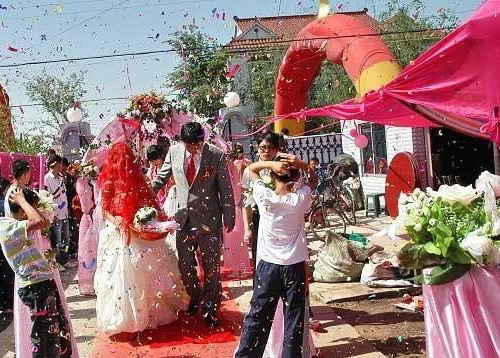|
The bridegroomm set up a shed as a temporary kitchen in his courtyard. People come in and out. Some are busy killing pigs or sheep, some are making cakes or steamed buns and some are making papercuts.
All preparations are being done in an orderly way. A list of the jobs is posted on the wall-a person in overall charge, cooks, accountants, and those responsible for receiving guests, preparing wine, carrying and heating water, odd jobs, etc. They are all bridegroom neighbors. They are happy to help the bridegroomand to come and add to the fun.

At dawn, a band start out to escort the bride to the wedding. According to tradition, they bring the dowry and two long cakes made of glutinous millet. When the womans family accept the two cakes, it mean that the woman will leave her mother. So the cakes are also called limugao(cakes for leaving mother). The bride daubed her face with ashes. It is said making herself ungainly with ashes could prevent her from being taken away by evil spirits on her way to the wedding. Of course, no one believes there are evil spirits today and the bride doesnt daub her face nowadays.
When the group come back to the village, firecrackers are set off and the band start playing music. After they enter the door of the house, according to tradition, they make kowtows to Heaven and their parents and they carry a rice container as a symbol for good crops into the bridal chamber. On the rice container is a mirror, a scale and ruler. It is said that the mirror detect demons and the scale and ruler had the function of hoping that the new couple will be upright, besides getting rid of evil spirits and wishing the couple a peaceful and happy life.
After the bride enter the bridal chamber, she first washes her face and combs her hair. These are adapted from the ancient customs of kailian and jiaji. The former means to pluck the fine hair off the brides face with a silk thread; the latter means that the girl should do her hair in bun and insert it with a pin. When the bride is ready, her mother-in-law bring a bowl of jiaozi. While the bride is eating jiaozi, her mother-in-law asks a question with a double meaning, "Shengma?" (sheng means "not mature" or "give birth" in Chinese; ma is a word indicating a question.) The shy bride answers yes. So the mother-in-law smiled with satisfaction: the daughter-in-law would like to have a healthy grandchild for her.
In Louchuan County, people put four small plates covered with bowls on a serving tray. The four plates contain coins, salt, wheat bran, and fried dough and the bride is asked to open the bowls. If she opens the plate with wheat bran (maifu), it is a sign that she will have a baby, because bran and happiness are homophonic in Chinese; if she opens the plate with salt, it means that husband and wife will live happily to a ripe old age. The worst thing is if she opens the plate with fried dough, because the fried dough symbols greed. However, the bride will get a hint before opening the plates. Therefore, no brides ever open the plate containing fried dough.
At night, people begin teasing the bride in the bridal chamber. Everyone can take part in the activity except her parents-in-law and her married brothers. All kinds of tricks are played on the bride and groom, so laughter can be heard in the bridal chamber. The custom of teasing the bride has a reason behind it. In the past, the bride and bridegroom didnt know each other because of the system of arranged marriage until the day they got married. Teasing the bride helped to dispel shyness between the newly acquainted couple. Now for the couple, who arranges their own wedding, teasing the bride not only adds to the happy atmosphere of the wedding, but promotes friendship among the relatives as well.
The day following the wedding, the couple will visit the brides family to thank the friends and relatives with gifts. As soon as the groom enters the house, his sister-in-law who is behind the door throws cooking ashes on his face; when he eats jiaozi, he will find that the stuffing is made of ground pepper and pod shells. This is a way to tease the new member of the family and create a good atmosphere.
Editor: Xie Fang
|

